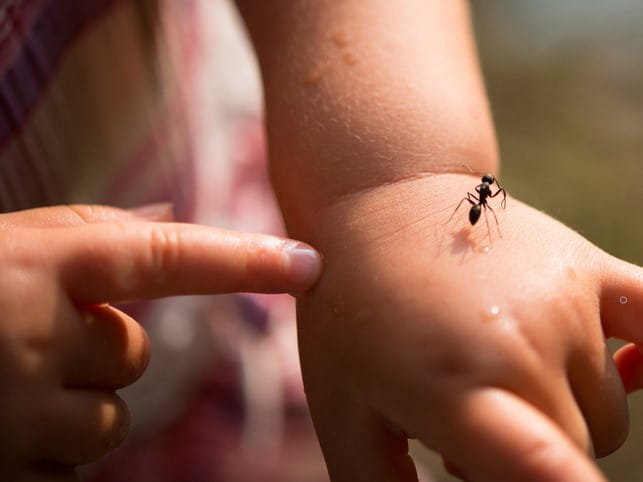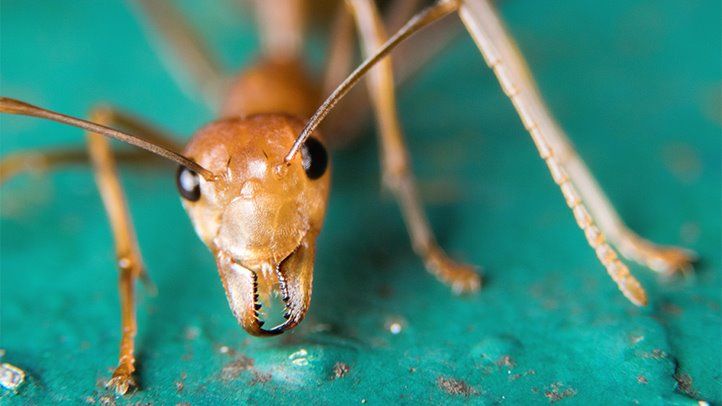Ant bites typically occur when disturbed, causing immediate pain and itchiness at the site. Ants bite as a defense mechanism when they feel threatened.
This reaction is a natural defense for the ant to protect itself or its colony. Ant bites are usually not serious but can trigger an allergic reaction in some individuals. In such cases, seek medical attention promptly. It is essential to understand the symptoms and treatment for ant bites to alleviate discomfort and prevent any complications.
By taking proper precautions and being aware of potential ant habitats, you can minimize the risk of getting bitten.
The Timing Of Ant Bites
Have you ever wondered when ants are most likely to bite? Ant bites can be annoying and sometimes painful, so it’s important to know when you might encounter them. The timing of ant bites can vary depending on different factors such as seasonal variations and day vs. night activity.
Seasonal Variations
Ant activity and bites can be influenced by seasonal variations. Ants are generally more active during warm weather, which means you’re more likely to encounter them and potentially get bitten during the spring and summer months. As the temperature rises, ants become more active in their search for food and nesting sites. It’s important to be cautious and take preventive measures during these seasons to avoid getting bitten.
Day Vs. Night
Ants are known to be active throughout the day, but their behavior can differ during night-time. Some ant species, such as fire ants, are primarily nocturnal and are more likely to bite during the night. These nocturnal ants usually nest in the soil and come out to forage after the sun sets. It’s important to be careful when walking or sitting outdoors during the evening to minimize the risk of getting bitten by these nocturnal ants.
In contrast, other ant species may be more active during the day. They may come out and search for food when the sun is shining, making it important to stay vigilant and take necessary precautions during daylight hours. While the chances of getting bitten during the day might vary depending on the specific ant species, it’s always a good idea to avoid disturbing ant colonies and their nests to prevent any potential bites.
Summary
Ant bites can occur during different times of the day and seasons. Understanding the timing of ant bites can help you prepare and take necessary measures to reduce the risk of getting bitten. Remember that ant activity and behavior can vary between species, so it’s essential to stay cautious and avoid disturbing their colonies or nesting sites. With proper precautions, you can enjoy your time outdoors without falling victim to ant bites.
:max_bytes(150000):strip_icc()/FireAntBite-9f9561b55155424b997d2bbb6cbccc7a.jpg)
Credit: www.health.com
Preventing Ant Bites
Ant bites can be painful and irritating. Taking steps to prevent ant bites can help you avoid these unpleasant experiences.
Eliminating Food Sources
Keep your kitchen and dining areas clean and free of crumbs and spills. Store food in sealed containers to prevent ants from being attracted to your home.
Sealing Entry Points
- Inspect your home for cracks and crevices where ants can enter.
- Seal gaps around windows, doors, and pipes using caulk or weather stripping.
- Install door sweeps to prevent ants from sneaking in under doors.
Treatment For Ant Bites
For ant bites treatment, apply a cold compress and clean the area. It’s important to watch for signs of an allergic reaction.
Ant bites can lead to redness, swelling, and discomfort. Swift treatment can alleviate symptoms and prevent infection. Let’s explore effective ways to manage ant bites.Home Remedies
– Apply a cold compress to reduce swelling. – Mix baking soda with water to create a paste and apply to the bite. – Use aloe vera gel to soothe the affected area. – Elevate the bite if possible to minimize swelling.Medical Intervention
– Seek medical attention if there are signs of an allergic reaction. – A healthcare provider may prescribe antihistamines to alleviate itching. – Topical corticosteroids can help reduce inflammation and discomfort. – In severe cases, antibiotics may be necessary to address infection.Remember, early treatment is key to managing ant bites effectively.Ant Bite Complications
Ant bites may seem harmless at first, but they can sometimes lead to complications. These complications can vary depending on the individual’s reaction to ant venom, the species of ant, and the conditions of the bite. Knowing about the potential complications can help you take appropriate measures to address these issues promptly. In this section, we will discuss two common complications of ant bites: allergic reactions and infection risks.
Allergic Reactions
Allergic reactions to ant bites can range from mild to severe. For individuals with a mild allergic reaction, the bite site may exhibit increased redness, swelling, and itching. Applying a cold compress and using over-the-counter antihistamines can help alleviate these symptoms.
However, some individuals may experience a severe allergic reaction known as anaphylaxis. This life-threatening reaction requires immediate medical attention. Symptoms of anaphylaxis include difficulty breathing, rapid swelling, dizziness, and a drop in blood pressure. If you or someone you know is experiencing these symptoms after an ant bite, call emergency services immediately.
Infection Risks
Ant bites can break the skin and create an opportunity for bacteria to enter the body, potentially leading to an infection. It is crucial to keep the bite site clean and prevent scratching or picking at the bite, as this can introduce further bacteria. If you notice signs of infection, such as increased pain, redness, warmth, or pus formation, seek medical attention promptly.
In some cases, ant bites can also cause cellulitis, a skin infection that spreads rapidly. Cellulitis is characterized by redness, swelling, tenderness, and sometimes fever. If you suspect cellulitis, consult a healthcare professional as soon as possible.
Distinguishing Ant Bites From Other Insect Bites
When it comes to identifying insect bites, it’s crucial to distinguish ant bites from bites of other insects. Ant bites may cause distinctive markings and pain levels that set them apart. Understanding these differences can help in proper treatment and relief from discomfort.
Characteristic Markings
Ant bites typically appear as small, raised, and red bumps on the skin. They often have a central point where the ant injected its venom, surrounded by a reddish or pinkish area. Some individuals may also experience a pustule forming at the bite site.
Pain Levels
Ant bites can cause varying levels of pain, but typically, they result in a sharp, stinging sensation that is localized to the bite area. The intensity of the pain might depend on the type of ant. Fire ants, for instance, are known for inflicting painful stings, while other ant species may cause mild to moderate discomfort.

Credit: www.poison.org
Signs Of An Ant Infestation
Ants are relentless invaders, and identifying signs of an ant infestation is crucial for effective pest control. These tiny creatures leave behind visible trails and establish nests, which are key indicators of an infestation. Understanding these signs can help prevent an ant invasion and protect your home from potential damage.
Visible Ant Trails
Visible ant trails are a clear indication of an ant infestation. These paths are often formed by a steady stream of ants traveling to and from a food source. You may notice these trails along baseboards, under cabinets, or near entry points like doors and windows. If you spot these trails, it’s important to act promptly to avoid a widespread infestation.
Presence Of Nests
The presence of ant nests, typically found in dark, secluded areas, such as within walls, beneath flooring, or in outdoor spaces, signifies an established ant colony. Nests may also be located in soil, tree stumps, or woodpiles near the property. Identifying and eliminating these nests is crucial in eradicating the infestation and preventing future ant intrusions.
Final Thoughts
Discovering when ant bites occur can help you anticipate their presence. Understanding the conditions that attract ants can help prevent unwanted encounters. It’s essential to remain vigilant and take appropriate action to avoid ant bites.
When dealing with ant bites, it is important to take the necessary steps to protect yourself and your loved ones. By seeking professional pest control services, you can ensure that the infestation is properly identified and treated. This not only saves you time and effort but also guarantees effective eradication of ants from your surroundings.Seeking Professional Pest Control
Professional pest control is a reliable solution for managing ants and their bites. These experts possess the knowledge and experience to identify the root cause of the infestation and implement effective measures to eliminate it. They use safe and environmentally friendly methods that target the ants without causing harm to humans or pets.When opting for professional pest control services, it is essential to choose a reputable company with a track record of successful ant eradication. Look for certifications and licenses, as they indicate that the technicians are qualified and competent. Additionally, read reviews and seek recommendations to ensure that you are hiring a reputable service provider.Promoting Safe Environments
Creating a safe environment is crucial in preventing ant bites. By taking proactive measures, you can minimize the risk of encounters with these tiny creatures. Here are some steps you can take to promote a safe environment:- Keep your living spaces clean and free from food debris that may attract ants.
- Seal any cracks or gaps in walls, windows, and doors to prevent ants from entering your home.
- Store food, especially sweets and other items that ants are attracted to, in airtight containers.
- Regularly inspect your garden and remove any potential ant nests.
- Keep outdoor trash cans clean and securely closed to discourage ants from scavenging for food.
:max_bytes(150000):strip_icc()/GettyImages-1194282404-11a00dd3aead436ca3e4efba92a5599c.jpg)
Credit: www.verywellhealth.com
Frequently Asked Questions For When Do Ant Bites
What Are The Symptoms Of Ant Bites?
Ant bites can cause redness, swelling, and itchiness at the bite site. In some cases, a raised welt or blister may appear. Severe allergic reactions can lead to difficulty breathing and chest tightness. It’s essential to seek medical attention if experiencing severe symptoms.
How To Treat Ant Bites At Home?
To alleviate ant bite symptoms, wash the affected area with soap and water, apply a cold compress to reduce swelling, and use over-the-counter antihistamine creams or oral medications. If swelling or pain persists, consult a healthcare professional for further treatment options.
Can Ant Bites Cause Allergic Reactions?
Yes, ant bites can trigger allergic reactions in some individuals, leading to symptoms such as hives, difficulty breathing, dizziness, and swelling of the throat and tongue. It’s crucial to monitor for severe reactions and seek immediate medical assistance if any concerning symptoms occur.
When Should I Seek Medical Help For Ant Bites?
Seek medical attention if you experience severe symptoms such as extreme swelling, rapid heartbeat, difficulty breathing, or nausea after an ant bite. Additionally, if there is a spreading rash, signs of infection, or if the symptoms do not improve with home treatment, consult a healthcare professional promptly.
Conclusion
Ant bites can occur at any time, particularly when we unknowingly disturb their nests or come into their territories. While most ant bites are not serious, they can still cause discomfort and allergic reactions in some individuals. It’s important to promptly clean and treat ant bites to prevent infection and reduce swelling.
Remember, prevention is key, so taking precautions and avoiding areas with high ant activity can help protect against bites. Stay safe and be mindful of these tiny creatures!

I’m MD Tanvir, and I bring years of expertise gained from working closely with pest control companies to the forefront. My journey in the industry has inspired me to launch Bug Battler, a platform aimed at equipping people with the know-how to combat pests autonomously. Through Bug Battler, I aim to empower individuals with practical insights to tackle pest infestations effectively.

